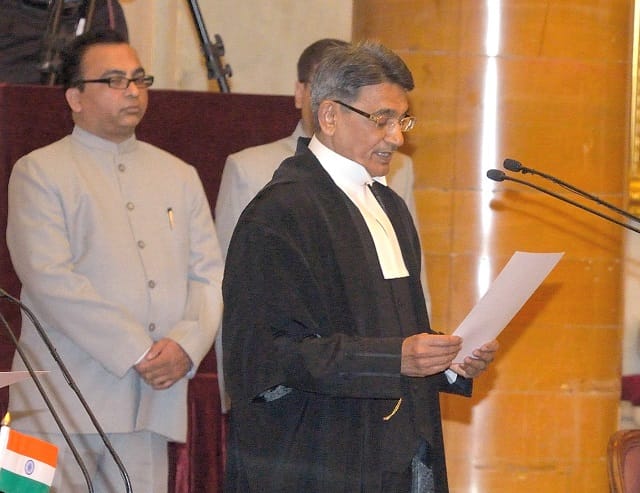The Supreme Court panel to regulate functioning of Medical Council of India disbanded itself at the end of its contentious one-year tenure without any report so far of having fulfilled its mandate.
Days before the Central government overturned the Supreme Court committee’s permission to 32 new private medical colleges to run courses, the court-appointed panel wrote to the health ministry saying it had disbanded, bringing an abrupt end to its controversial tenure.
In a letter dated 15 May, the Justice R.M. Lodha committee — set up last year by the apex court to clean up the process of granting permissions to medical colleges — said that it “considers that its tenure mandated in the order of the Hon’ble Supreme Court has come to an end on 15 May 2017…and it has ceased functioning with effect from 16 May 2017”.
The letter, accessed by ThePrint, adds that it will accept no more representations, that there will be no more visiting hours to meet the committee and that “time for winding up the establishment” is allowed until the 30 June 2017.
The mandate of the three-member committee was to clean up the alleged irregularities of the Medical Council of India (MCI) in regulating medical colleges.
Ironically, the committee’s permissions to over 30 new medical colleges were themselves mired in controversy because many of them did not have sufficient infrastructure such as faculty, labs and medical equipment. In a public snub to its year-long work, the health ministry recently banned 32 of these private colleges from admitting new students for two years.
A source who interacted with the committee and spoke on the condition of anonymity, said that it was “quite unusual” for it to declare that it is winding up so abruptly. Committees, in general, would seek clarification from either the ministry or the court before disbanding, the source added.
If the committee is wound up now, questions will be raised about its performance, the manner in which it granted permissions to ill-equipped medical colleges, its turf war with the MCI and whether it succeeded in its objective of cleaning up irregularities in the procedures, said the source.
The flip-flop between the government and the court committee in rejecting and granting permissions to colleges in the past year has not only led to confusion among students and institutions, but has also raised questions about the awkward process of judicial oversight.
Text messages and an email sent by ThePrint to the committee office and MCI seeking comment were not responded to.
K.K. Aggarwal, president of the Indian Medical Association, said that the fact that Lodha Committee has disbanded shows that it found no malpractices by the MCI.
“There is no Lodha Committee report on MCI’s malpractices in the public domain. The committee has not asked for any extension. This is a good sign for the medical profession, it means we have nothing to be alarmed about,” Aggarwal said. “It found nothing wrong with the MCI, and it is winding up.”
Curiously, on 29 May, the Shridev Suman Subharti Medical College in Dehradun submitted a petition in the Supreme Court seeking an extension to the Lodha Committee.
The petition argued that the MCI “can no longer be entrusted with the responsibility” of implementing “much needed reforms”. It says that the Lodha Committee, in the past year, performed its duties in improving the medical profession and has been working on “overhauling and revamping the regulatory framework of medical education and practice”.
The court responded by saying this was not an urgent matter and can be heard in July.
The Lodha Committee was overseeing the processes of renewal of permissions to medical colleges, increase in the number of seats in some colleges, granting of new permissions and recognising others.
The manner in which it granted permissions to the new colleges, overriding MCI’s objections, generated much controversy last year.
The committee had said at that time that it received more than 65 complaints from colleges about the “unfairness and injustice in the inspections/assessments made by MCI”. It said that in a number of cases “opportunity may not have been afforded to the applicant colleges for furnishing compliance to the deficiencies noticed in inspections”.
The MCI refuted this and sent details of its compliance investigations.
But the Lodha Committee decided “purely as a onetime measure” to extend the time schedule for fresh inspection of the applicant colleges. In August 2016, the committee directed the Central government to grant conditional permissions to more than 60 colleges.
A fresh round of inspections was conducted by teams jointly appointed by the Lodha Committee and MCI. The final report, submitted by the MCI in December last year, also found gross deficiencies.
But six months later, on 14 May, the Lodha Committee dismissed many of these comments about deficiencies listed by the MCI as either subjective or as being within permissible limits.
The committee also requested the ministry, rather belatedly, to consider devising appropriate modalities to admit students so that the “potential loss of hundreds of seats in undergraduate courses in the country” can be avoided and “likely adverse situation” can be overcome.
#






